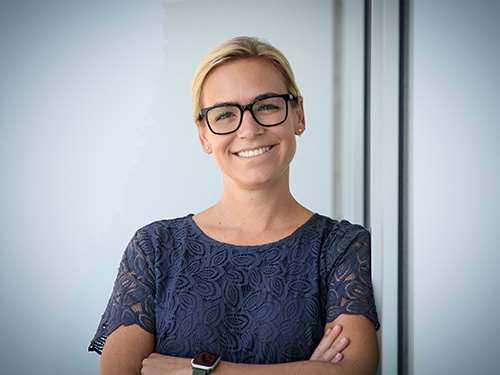AS in Radiography
Develop expertise in a high-demand health care field.
Join the fast-growing field of radiography and serve an essential role in diagnosing patients. As a radiographer, you will perform diagnostic imaging, such as X-rays, to aid doctors in properly treating patients. Radiographers must be highly trained in the technical administration of radiation and imaging equipment, as well as skilled in patient care. Radiographers have a range of job opportunities in acute, ambulatory, long-term healthcare settings, and physicians’ offices, with patients of all ages and medical needs.
About the Program
Program Length: 2-3 years (part-time study)
Courses: 62 credits
Degree: Associate of Science in Radiography
The associate degree in radiography at Sacred Heart University equips you with the foundational skills and knowledge for a career in radiography. Combining sciences with the humanities, our curriculum not only readies you for entry-level work in the medical field, it also prepares you for lifelong learning.
Program coursework covers a range of topics in the radiologic sciences, including:
- Basic equipment operation
- Quality control
- Radiation protection
- X-ray circuits
- Digital imaging
- Specialized modality imaging
Visit Us Join us for an in-person or virtual info session!
Learn MoreProgram Mission
The mission of the radiography program is derived from SHU’s mission. It focuses on the education of radiographers who provide diagnostic services for the sick. The mission provides a sound and stable educational environment where a diverse student population has the freedom to learn and grow intellectually, as well as develop competencies in clinical skills. The faculty members are qualified and caring professionals dedicated to excellence in radiography education, health care, lifelong learning and SHU’s mission. This establishes a technical educational foundation upon which students of radiography may continue to build their professional careers.
Program Objectives
Associate of Science in radiography graduates will:
- Demonstrate charity and respect for the human dignity and rights of all individuals
- Function as entry-level technologists in the health care delivery system
- Provide diagnostic services with related teaching in structured health care settings
- Demonstrate accountability for legal and ethical practice
- Demonstrate responsibility and accountability for personal and professional behavior
- Participate in professional activities and continuing education, consistent with the standards of the American Registry of Radiologic Technologists
Program Goals & Student Learning Outcomes
- Students will be prepared to function as entry-level professionals in the health care delivery system.
- Students will apply entry-level positioning skills.
- Students will select appropriate exposure factors for quality imaging.
- Students will practice appropriate radiation protection.
- Students will demonstrate appropriate communication skills.
- Students will use appropriate vocabulary and language to convey information, concepts and ideas.
- Students will use a systematic approach to locate and use information to plan and write professional papers.
- Students will develop and practice effective problem-solving skills and critical-thinking skills.
- Students will manipulate technical factors for nonroutine examinations.
- Students will adapt positioning for trauma patients.
- Students will produce solutions to real-world clinical situations.
- Students will critique radiographic images for diagnostic quality.
- Students/graduates will understand the importance of professional growth and development.
- Graduates will participate in professional activities with state or national societies.
- Graduates will demonstrate charity and respect for human dignity and rights of all individuals.
- Graduates will utilize professional judgement in delivering patient care.
- Graduates will contribute to society through involvement in community service activities.
- The program will maintain the following program effectiveness data:
- Eighty-five percent (85%) of graduates will pass the ARRT certification examination on the first attempt within six months post-graduation.
- Seventy-five percent (75%) of graduates seeking employment will be gainfully employed within 12 months post-graduation.
- Eighty percent (80%) of students will complete the program within 24 months.
- Graduates will be satisfied with their radiography education.
- Employers will be satisfied with the graduates’ entry-level performance.
Admission Requirements
Admission to the radiography major is based on the successful fulfillment of the College admission requirements. Review general admission criteria.
Clinical Experience
Ample clinical experience in local healthcare facilities and on-site skills laboratory work allow you to apply what you learn in the classroom to a real-world setting. Clinical affiliates provide access to a sufficient variety and volume of radiographic and fluoroscopic procedures to offer students an educationally valid clinical experience. Clinical experiences provided at Hartford HealthCare, Griffin Hospital, Norwalk Hospital, Yale New Haven Health System, multiple orthopedic centers, acute care facilities and other free-standing medical imaging facilities throughout the Fairfield and New Haven counties. Clinical rotations are generally from 8 a.m. to 4 p.m. or 4 to 10 p.m. depending on the specific clinical assignment. In the second year, students will rotate through other medical imaging modalities such as CT, MRI, interventional, radiation therapy and more. Sites are located up to 60 miles from the campus and students are responsible for all transportation and parking costs.
The hands-on learning at clinical and in our lab on campus is my favorite part of the program. Every day at clinical is a new experience where I learn something. I enjoy applying what we learn in the classroom to the clinical setting.
Accreditation
The associate of science degree radiography program is accredited by the Joint Review Committee on Education in Radiologic Technology (JRCERT).
20 North Wacker Drive, Suite 2850
Chicago, IL 60606-3182
312-704-5300
mail@jrcert.org
The program’s current accreditation award is eight years. General program accreditation information and the current accreditation award letter can be found online.

Deirdre Valinsky, MHS, RRA, RT(R)(CT)(ARRT)

Annie Froschl, BHS, RT(R)(CT(ARRT)

Guljana Torikai, MA
Where Can You Go with an Associate Degree in Radiography?
In addition to working as a radiologic technologist, you can take your education to the next level.
Questions? Contact Us
If you have questions throughout the application process, contact:
The Latest in Health Sciences
View More News-

New Organizational Transformation Fellows Named
Academics, Advancing SHUPublished:Faculty and staff will collaborate on projects that advance workplace culture, professional growth and organizational change -

SHU Junior Merges History and Medicine
Academics, Student Spotlight & OutcomesPublished:Health science student Matt Dworkowitz explores the birth of chemotherapy while preparing for medical school -

Professor’s Research Examines Sexual Misconduct at Live Music Events
Academics, Faculty & Staff SpotlightPublished:After publishing a study on sexual harassment and assault at live music events, Dr. Anna Price plans to focus on prevention





